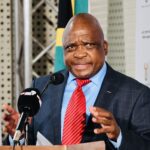“Whenever there is a crisis, I’m called in to solve them, but I don’t have the legal mechanism to prevent them,” says minister.
Cosatu has called on President Cyril Ramaphosa to remove Health Minister Aaron Motsoaledi.
“While we understand that health is a provincial competency, it is the centre that has collapsed leaving the provinces feeling their way in the dark. The health system does not need more dialogue, speeches, summits or presentations but needs decisive action,” said Cosatu spokesperson Sizwe Pamla in a statement released late Wednesday.
The union’s remarks make reference to Motsoaledi’s repeated explanations that current legislation does not allow him to intervene in provincial health crises.
“I only come in as a sort of postmortem, because there is no mechanism for me to intervene before these things happen. Like human resources, procurement is controlled provincially,” he told Bhekisisa in May.
Instead, the minister explained the only “tools” he can use to get provincial health departments to work with him is “goodwill”. “Intervening sometimes does happen, but not with the full backing of the law. It happens maybe with some political gravitas, or goodwill, or humanity, or a sense of co-operation.”
Political analyst Ralph Mathekga said Motsoaledi is right, the law gives him very little power in provinces, he told Bhekisisa. Until now, he said, the ANC has had an implicit “gentleman’s agreement” between its officials in Pretoria and those in the provinces to keep the peace. An agreement, he warned, that could be on the wane.
At a Tuesday press conference, Motsoaledi denied the health system had “collapsed” but admitted that it was “going through hard times” with overcrowding and treatment backlogs at hospitals on the increase.“Our health system is still able to look after the largest number of HIV-positive people globally,” Motsoaledi argued.
But the minister’s utterances at the conference seem to not only have provoked Cosatu but also the Economic Freedom Fighters (EFF), which has now accused him of “denialism”. The party has also questioned why he hasn’t been able to amend legislation to take back more power from the provinces — a change he has, in part, proposed under the National Health Insurance (NHI). The government must amend at least 12 pieces of legislation to allow for changes like this under the NHI.
“For some time now, he keeps blaming provincial powers and jurisdiction for failure of his intervention to fix the public healthcare. If Motsoaledi thinks centralising power is a solution, by now, he should have already proposed the necessary legislative changes. To this day, he has not, because, in reality, he is not genuine and not committed to the upliftment of the system,” said the party in a statement.
But until the national health department has more say in how provincial health departments function, Motsoaledi says he’s largely powerless to prevent provincial health crises. He sat down with Bhekisisa editor Mia Malan recently to explain.
1. Are your hands tied when it comes to provincial emergencies?
Whenever there is a crisis, like with Life Esidimeni or the oncology crisis in KwaZulu-Natal, I am called in to solve them. But I don’t have the legal mechanism to prevent these crises from happening, because Health MEC’s don’t report to me; they report to their respective Premiers.
Interventions sometimes do happen, but it happens without the full backing of the law. It happens maybe with some political gravitas, or goodwill, or humanity, or a sense of cooperation.
You can’t run a country by hoping.
2. Why is corruption so rife in procurement?
In the health department, you have to buy everything: medicine, linen, food, cleaning services, laundry services. In every corner you look, there is something that needs to be bought.
I think that’s what causes our problems. I won’t shy away from it.
Procurement is a bone of contention, especially in the North West. I [the national health minister] only come in as a sort of a post-mortem. Under no circumstances would I have agreed on a procurement like [the R190-million illegal tender to the Gupta-linked] Mediosa to take place. But I am forced to come in when it is already too late.
3. How do politics affect service delivery?
As a minister, you have no say in who gets hired and at what level. Human resources is a purely provincial function, which is exercised by the Premier – not even by the MEC.
The health minister is an executing authority only for those people who are hired at a national level. But for all the others who are working in hospitals, that’s where delivery is, executing authority is the MEC.
For example in the North West, I pleaded with the Premier not to appoint the current head of health [Thabo Lekalakala]. But he insisted, and there was no law under which I could stop him. I knew Lekalakala couldn’t run a directorate.
4. What’s the solution?
Our dreams of a National Health Insurance (NHI) will never happen if our provincial health systems aren’t working. In the NHI white paper, we are proposing that 12 acts need to be amended. We are targeting the issues of human resources, financial management and procurement specifically.
5. What else has to change for the NHI to work?
One of the reasons there is good quality in the private sector is because the person who buys services is not the same as the one who provides them.
In the public sector, the purchaser and the provider is one person, the MEC. The MEC is given a budget by the treasury to provide health services to citizens. The MEC must go and hire nurses, make sure there is equipment, and then go purchase the services for the citizens the same services he has provided.
Whether the services are good for the citizens or not, it doesn’t matter – nothing pushes you.
Under the NHI, districts will be able to send their patients to where the best service is. That set-up will create more competition and credibility, and force people to jack up [their services].
[This story was updated at 7:39am on 7 June 2018]
Mia Malan is the founder and editor-in-chief of Bhekisisa. She has worked in newsrooms in Johannesburg, Nairobi and Washington, DC, winning more than 30 awards for her radio, print and television work.





